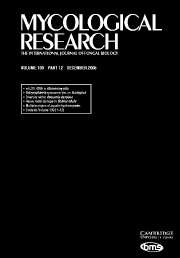Crossref Citations
This article has been cited by the following publications. This list is generated based on data provided by
Crossref.
Spatafora, J. W.
2001.
Symbiosis.
Vol. 4,
Issue. ,
p.
589.
Nasir, Habib
and
Noda, Hiroaki
2003.
Yeast‐like symbiotes as a sterol source in anobiid beetles (Coleoptera, Anobiidae): Possible metabolic pathways from fungal sterols to 7‐dehydrocholesterol.
Archives of Insect Biochemistry and Physiology,
Vol. 52,
Issue. 4,
p.
175.
Noda, Hiroaki
and
Koizumi, Yoko
2003.
Sterol biosynthesis by symbiotes: cytochrome P450 sterol C-22 desaturase genes from yeastlike symbiotes of rice planthoppers and anobiid beetles.
Insect Biochemistry and Molecular Biology,
Vol. 33,
Issue. 6,
p.
649.
SUH, S
and
BLACKWELL, M
2004.
Three new beetle-associated yeast species in the clade.
FEMS Yeast Research,
Vol. 5,
Issue. 1,
p.
87.
Suh, Sung-Oui
McHugh, Joseph V.
and
Blackwell, Meredith
2004.
Expansion of the Candida tanzawaensis yeast clade: 16 novel Candida species from basidiocarp-feeding beetles.
International Journal of Systematic and Evolutionary Microbiology
,
Vol. 54,
Issue. 6,
p.
2409.
Suh, Sung-Oui
Gibson, Cara M.
and
Blackwell, Meredith
2004.
Metschnikowia chrysoperlae sp. nov., Candida picachoensis sp. nov. and Candida pimensis sp. nov., isolated from the green lacewings Chrysoperla comanche and Chrysoperla carnea (Neuroptera: Chrysopidae).
International Journal of Systematic and Evolutionary Microbiology
,
Vol. 54,
Issue. 5,
p.
1883.
Suh, Sung-Oui
Nguyen, Nhu H.
and
Blackwell, Meredith
2005.
Nine new Candida species near C. membranifaciens isolated from insects.
Mycological Research,
Vol. 109,
Issue. 9,
p.
1045.
Ganter, Philip F.
2006.
Biodiversity and Ecophysiology of Yeasts.
p.
303.
Blackwell, Meredith
Suh, Sung-Oui
and
Nardi, James B.
2007.
Fungi in the Environment.
p.
357.
Berkov, Amy
Feinstein, Julie
Small, Jacinta
Nkamany, Mary
and
Centeno, Pedro
2007.
Yeasts Isolated from Neotropical Wood‐Boring Beetles in SE Peru.
Biotropica,
Vol. 39,
Issue. 4,
p.
530.
Vega, Fernando E.
Goettel, Mark S.
Blackwell, Meredith
Chandler, David
Jackson, Mark A.
Keller, Siegfried
Koike, Masanori
Maniania, Nguya K.
Monzón, Arnulfo
Ownley, Bonnie H.
Pell, Judith K.
Rangel, Drauzio E.N.
and
Roy, Helen E.
2009.
Fungal entomopathogens: new insights on their ecology.
Fungal Ecology,
Vol. 2,
Issue. 4,
p.
149.
Walczyńska, Aleksandra
2009.
Bioenergetic strategy of a xylem-feeder.
Journal of Insect Physiology,
Vol. 55,
Issue. 12,
p.
1107.
Geib, Scott M.
Jimenez-Gasco, Maria del Mar
Carlson, John E.
Tien, Ming
and
Hoover, Kelli
2009.
Effect of Host Tree Species on Cellulase Activity and Bacterial Community Composition in the Gut of Larval Asian Longhorned Beetle.
Environmental Entomology,
Vol. 38,
Issue. 3,
p.
686.
Grünwald, S.
Pilhofer, M.
and
Höll, W.
2010.
Microbial associations in gut systems of wood- and bark-inhabiting longhorned beetles [Coleoptera: Cerambycidae].
Systematic and Applied Microbiology,
Vol. 33,
Issue. 1,
p.
25.
Ravella, Sreenivas Rao
Donovan, Neil
James, Stephen A.
Shivaji, Sisinthy
Arunasri, Kotakonda
Bond, Christopher J.
Roberts, Ian N.
and
Hobbs, Phil J.
2011.
Candida northwykensis sp. nov., A Novel Yeast Isolated from the Gut of the Click Beetle Melanotus villosus.
Current Microbiology,
Vol. 63,
Issue. 2,
p.
115.
2011.
The Yeasts.
p.
r1.
Geib, Scott M.
Scully, Erin D.
Jimenez-Gasco, Maria del Mar
Carlson, John E.
Tien, Ming
and
Hoover, Kelli
2012.
Phylogenetic Analysis of Fusarium solani Associated with the Asian Longhorned Beetle, Anoplophora glabripennis .
Insects,
Vol. 3,
Issue. 1,
p.
141.
Lou, Qiao-Zhe
Lu, Min
and
Sun, Jiang-Hua
2014.
Yeast Diversity Associated with Invasive Dendroctonus valens Killing Pinus tabuliformis in China Using Culturing and Molecular Methods.
Microbial Ecology,
Vol. 68,
Issue. 2,
p.
397.
Scully, Erin D
Geib, Scott M
Carlson, John E
Tien, Ming
McKenna, Duane
and
Hoover, Kelli
2014.
Functional genomics and microbiome profiling of the Asian longhorned beetle (Anoplophora glabripennis) reveal insights into the digestive physiology and nutritional ecology of wood feeding beetles.
BMC Genomics,
Vol. 15,
Issue. 1,
Paulson, Amber R
von Aderkas, Patrick
and
Perlman, Steve J
2014.
Bacterial associates of seed-parasitic wasps (Hymenoptera: Megastigmus).
BMC Microbiology,
Vol. 14,
Issue. 1,


